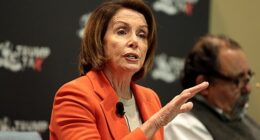Cheney Says Trump Lacks Willingness To Abide By The Law, You Agree?

Cheney Alerts to ‘Putin Group’ in Republican Party
Liz Cheney, formerly serving Wyoming as a Republican representative and known for her candid opposition to Donald Trump, recently highlighted a concerning trend within her party, dubbing it the “Putin wing.” This term reflects a growing faction within the GOP that she believes aligns too closely with the autocratic tendencies seen in Russian leadership. Cheney’s remarks came during a conversation on CNN’s “State of the Union,” where she voiced her unease over Trump’s stance towards NATO and his muted response to the tragic demise of Alexei Navalny, a figure synonymous with the fight against corruption and for democratic values in Russia.
Cheney’s concern is rooted in Trump’s apparent reluctance to stand by NATO allies in the face of potential Russian aggression, coupled with his nonchalant attitude towards Navalny’s death. These positions, she argues, signal a dangerous shift in Republican foreign policy, one that veers towards the authoritarian. She underscored the critical nature of this issue in the upcoming election cycle, stressing the imperative to ensure that such a perspective does not gain a foothold in the White House.
While Cheney steered clear of endorsing any presidential candidate, she expressed a firm commitment to thwarting Trump’s potential return to presidential power. She criticized Trump’s approach to international commitments, particularly his cavalier attitude towards NATO obligations, which she sees as a threat to national security. Cheney’s critique extends to GOP members who continue to back Trump despite these concerning stances, suggesting they share responsibility for the implications on national security.
Moreover, Cheney drew parallels between Trump’s hints at targeting political adversaries and the harrowing fate of Navalny, suggesting such rhetoric mirrors the repressive measures employed by authoritarian regimes like Putin’s Russia. Her comments reflect deep apprehensions about the direction of the Republican Party and the principles it stands for, especially in matters of democracy and international relations.


